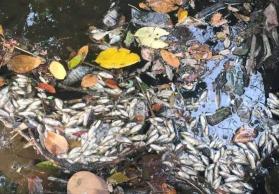FMLN National Sexual Diversity Collective: At the Forefront of the Left
In 2007, long-time LGBTI leaders Aleja Menjivar, Ana Cisneros, and Nestor Urquilla began thinking about ways to center the experiences and demands of the LGBTI community within the Farabundo Martí National Liberation Front's (FMLN) party platforms. By 2009, they were mobilizing to influence the presidential proposals of then FMLN presidential candidate Mauricio Funes, although resistance from within the party remained. In 2012, they sat down with the FMLN Youth Secretariat and proposed joining forces; in November of 2016, after much persistence and with the support of the FMLN Women’s, Youth, and Social Movement Secretariats, the FMLN National Sexual Diversity Collective was officially founded.
Soon after, the Collective participated in community consultations at the local, municipal, and departmental levels ahead of the 2018 Municipal and Legislative elections. The purpose of the group is to be a reference point for the LGBTI community and to push the FMLN to be more proud and vocal about their support for the LGBTI community. In Aleja Menjivar’s words, cofounder of the LBGTI collective and FMLN delegate to the Forum of Sao Paolo: "Together with Ana and Nestor, we have been participating [in the FMLN] for years, it has not been easy, we were the first public faces and activists of the LGBTI community within the FMLN, but there are many more LGBTI people in the party. That they feel identified with the Collective or want to join or be visible is something else. We have a commitment to always respect and support those who are publicly visible as LGBTI, along with those who do not want to show their face, (we) publicly join efforts to advance and build the party.”
The LGBTI community has achieved important victories through grassroots lobbying of both the FMLN and right-wing political parties. In 2001, for example, they pressed the Salvadoran Legislature to pass the HIV/AIDS law, which made the state responsible for providing integrated care for people with HIV/AIDS and established the National Council on HIV/AIDS (CONASIDA) to carry out the newly established government mandate.
In 2009, however, the National Republican Alliance (ARENA), El Salvador’s extreme right-wing party, led efforts to pass a constitutional amendment that would explicitly prohibit same-sex marriage in the country. The LGBTI community had been primarily focused on addressing the HIV/AIDS crisis but galvanized to respond to this reactionary threat. When it came time to vote on the proposed anti-same-sex amendment, FMLN deputies publically proclaimed their support for the LGBTI community by abstaining. It was a landmark moment, given that advocating for the LGBTI community was a politically risky move at the time.
Later in 2010, former president Funes issued Decree 56, which prohibited LGBTI discrimination in the public sector. His administration also established the Sexual Diversity Directorate within the Secretary of Social Inclusion to prohibit legal and cultural discrimination on the basis of sexual orientation and gender identity and to establish public policies and services responsive to the needs of the LGBTI community. Finally, in 2015, through a coordinated effort by civil society and the FMLN, the Salvadoran Legislature reformed the Penal Code to designate threats and homicides committed against LGBTI people as hate crimes.
Going forward, the Collective seeks to consolidate a network of FMLN supporters and militants at the national level, organize a series of political schools that highlight the importance of LGBTI political participation, develop workshops on gender, sexuality, and human rights for LGBTI militants and other FMLN base committees, and host the FMLN’s first National Conference on Sexual Diversity. They hope that this on-the-ground work will lead to full-fledged Secretariat status by 2020.
Through the activism of LGBTI movement at large and now the internal pressure from LGBTI FMLN militants, the FMLN has made various advances in the treatment of the LGBTI community in El Salvador. The Collective is an innovative effort to further deepen inter-community understanding and further platforms withing the FMLN that center the needs to the community. For Aleja, this open line of communication between the party and the movement is critical because “the first step in order to transform the system is to unlearn and deconstruct hegemonic thinking.”

 "I am a CISPES supporter because continuing to fight for social justice and a more people-centered country means continuing the dream and sacrifice of thousands of my fellow Salvadorans who died for that vision.” - Padre Carlos, New York City
"I am a CISPES supporter because continuing to fight for social justice and a more people-centered country means continuing the dream and sacrifice of thousands of my fellow Salvadorans who died for that vision.” - Padre Carlos, New York City

